Palma de Mallorca 3-Day Itinerary: How to Plan a Fantastic Long Weekend

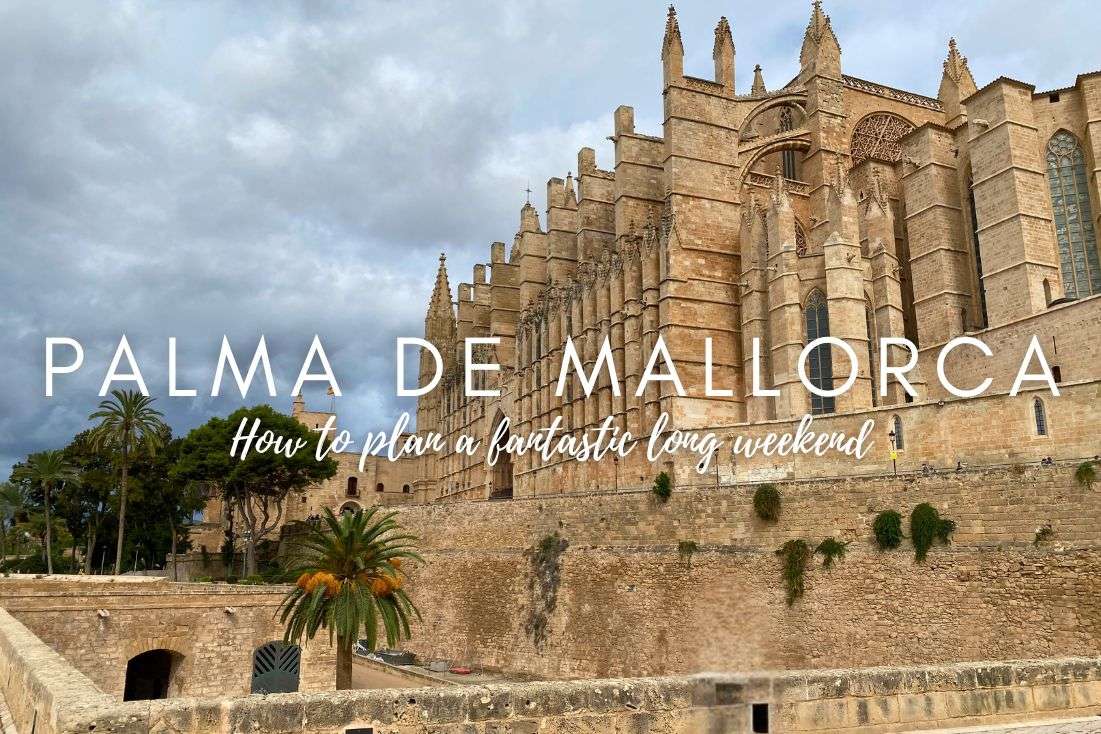
Got 3 days in Palma? It’s not much, but hey, you’ve got to work with what you have… and they don’t want you there for longer anyway! But more about that later. Honestly, even 3 days is too much for just Palma—lucky for you, the island of Mallorca, part of the stunning Balearic Islands, is so small you can make plenty of trips outside the city within those 3 days.
Tip: If you have more than 3 days in Mallorca, scratch Palma—even if it's your first trip, I say base yourself in pretty little Sóller instead and explore from there. I explain why (and how) in my 7-day Mallorca itinerary. Don't worry, visiting Palma is part of the plan.
How to spend 3 days in Palma de Mallorca
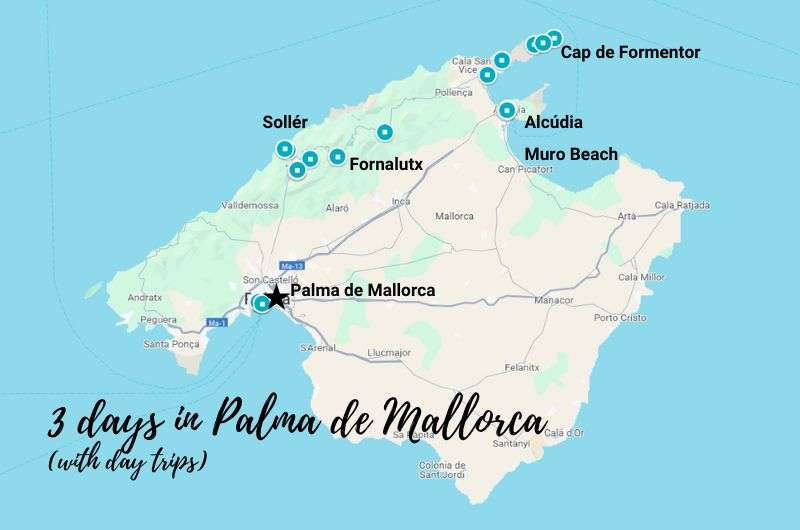
Is Palma worth visiting? Absolutely! Here are the best places to see in 3 days
Whether it’s a long weekend in Palma or just a very short vacation in Mallorca, here’s an itinerary that guarantees you make the most of your 3 days:
Day 1: Full day in Palma (including Royal Palace, Cathedral, Bellver Castle)
Day 2: Sóller, Fornalutx, Sa Calobra, driving in Tramuntana mountain range
Day 3: Cape Formentor, Alcúdia Old Town, Muro Beach
This itinerary expects you to rent a car so you can get around comfortably, quickly, and flexibly.
Sometimes, all you need to do is take the first step... I've filtered out the best hotels in Palma for you
Save it for yourself to come back to later, or share with your friends on social media!
Is Palma worth visiting?
Yes, visiting Palma is absolutely worth it, thanks to its perfect blend of island vibes and rich history. One of the best things about Mallorca's capital city is its location. Everything on the island is within an hour’s drive or less, so a 3-day stay in Palma doesn’t just mean exploring the city—it means you can realistically see a good chunk of Mallorca’s top attractions. Whether it’s the breathtaking beaches, the dramatic cliffs of Cap de Formentor, or the picturesque mountain villages, all these gems are within easy reach and totally doable even on a long weekend in Palma. It’s a complete catch!
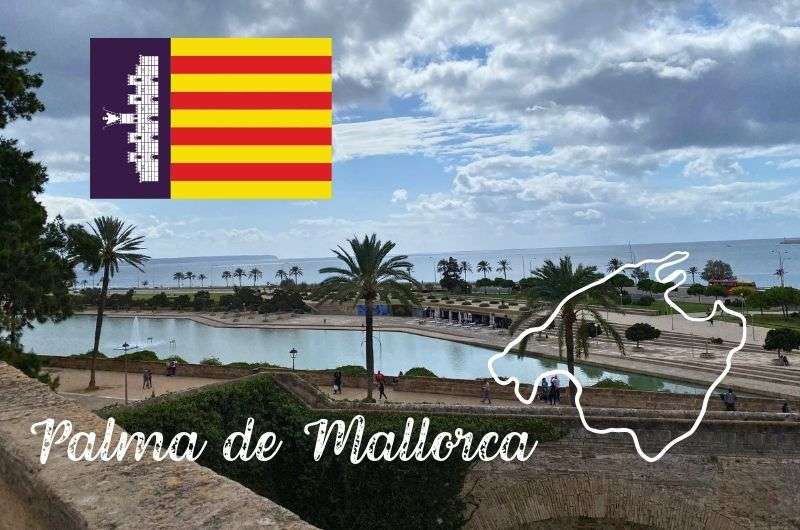
Palma is a place you will fall in love with
My top tips on 3 days in Palma de Mallorca itinerary
- Don’t visit Palma on a Monday. A lot of places are closed, like the Royal Palace and Bellver Castle.
- Rent a small car. You’ll want it for the day trips. But there’s a reason small hatchbacks are so popular in Spain (narrow roads and tiny parking spots make driving regular-sized vehicles a pain!).
- Take a stroll through Palma’s Old Town at night. The narrow, winding streets of the Old Town are enchanting after dark, with the illuminated cathedral and palace the backdrop. With the day’s heat gone, it’s the perfect time for exploring Palma.
- Visit Mallorca before mid-June to mid-September. Crowds will be more manageable, hotels won’t be full, and most of all, the spectacular road on Cape Formentor will be opened to private vehicles.
Adults-only hotels in Palma de Mallorca
Hotels in Palma have always been on the expensive side, but since the overtourism crackdown, they’re not only expensive, but hard to find, too! Unless you’re loaded, in which case you probably won’t even notice.
Hotels with parking, great breakfast, and no annoying offspring ruining your expensive stay are even harder to come by, but they do exist! I recommend El Llorenç Parc de la Mar, a 5-star adult-only hotel with a rooftop pool and bar with sea views that’s just a 10-minute walk to Palma’s cathedral. It is located right by a coastal park and close enough to the highway to easily get out of the city when your Palma itinerary calls for it.
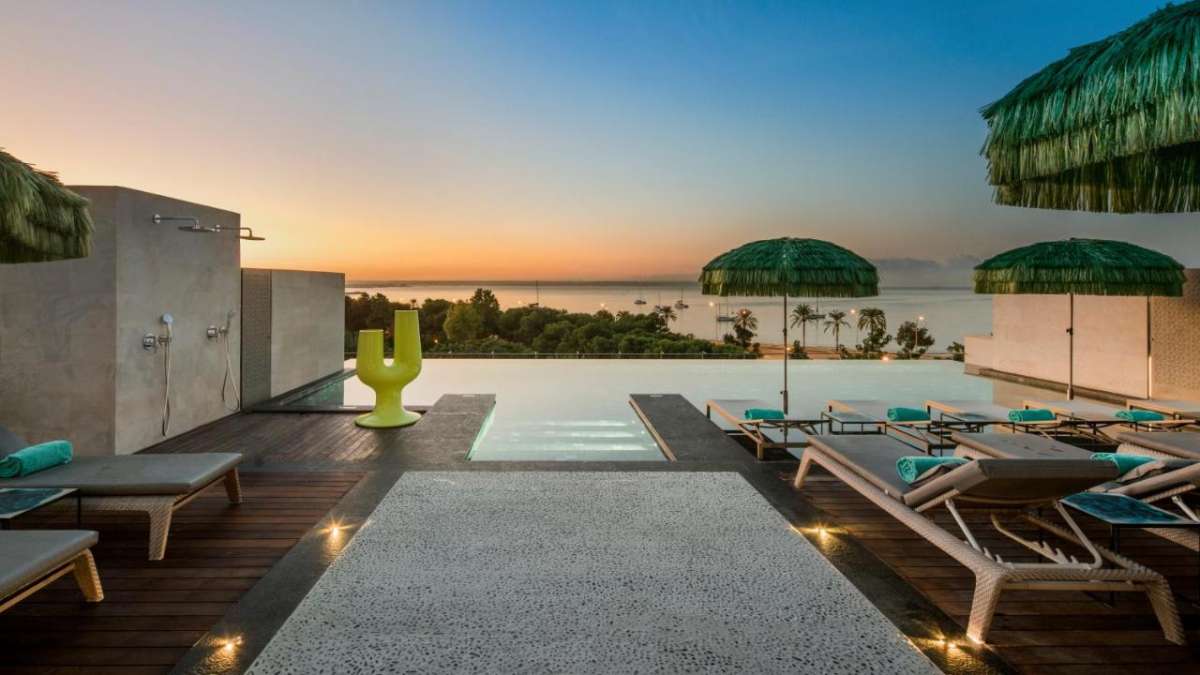
For those offended by adult-only hotels: Oh, stop it, you secretly hate kids in hotels just like the rest of us, even if you have your own. You’re just jealous you can’t stay in adult-only hotels yourself because you decided to reproduce. Just wait a few years, your time will come!
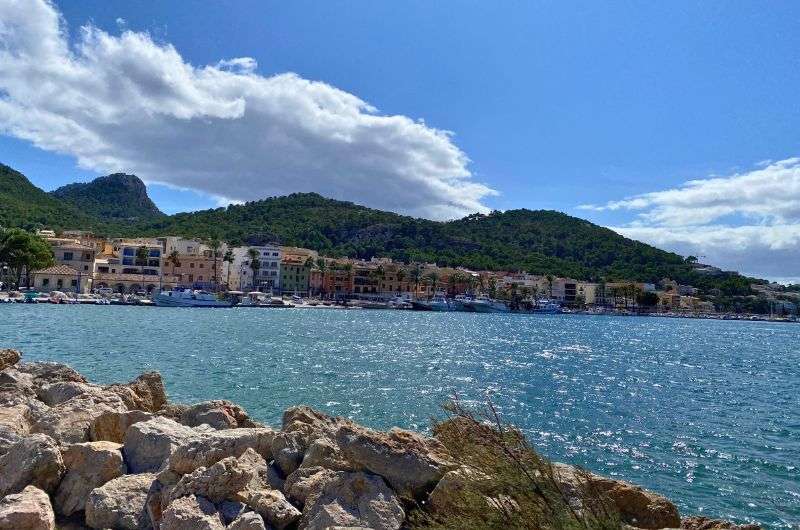
The demand for hotels in Palma de Mallorca is quite high, as are their prices. Choose well and early!
They don’t want you there! Aka Mallorca has a problem with overtourism
You might want to spend a few days in Mallorca, but they’re not as excited about you coming. I don’t want to burst your travel bubble, but Mallorca has been on a little tourist hunt in 2024-„Enough is enough!“ they said, slashing 18,000 hotel beds right out from under would-be visitors.
Why the crackdown? Well, Mallorca, with a population of less than 1 million, has been grappling with overtourism for years, and it’s reached a boiling point. With almost 18 million visitors in 2023, I get where they’re coming from. I hate people too! Prices have been driven up, beaches are packed, the quaint villages are like little Disneylands, and the local vibe is starting to be noticeably hostile.
This means that finding a place to stay in Mallorca just got a whole lot more competitive, which, especially if you’ve had experience trying to book a hotel in Palma in the past few years, is something that seems almost impossible! The capital city specifically seems perpetually overbooked.
But since you’re dead set on heading on a Mallorca trip (and don’t worry, all the people I encountered were actually lovely), here’s how to get from the airport to Palma city center…

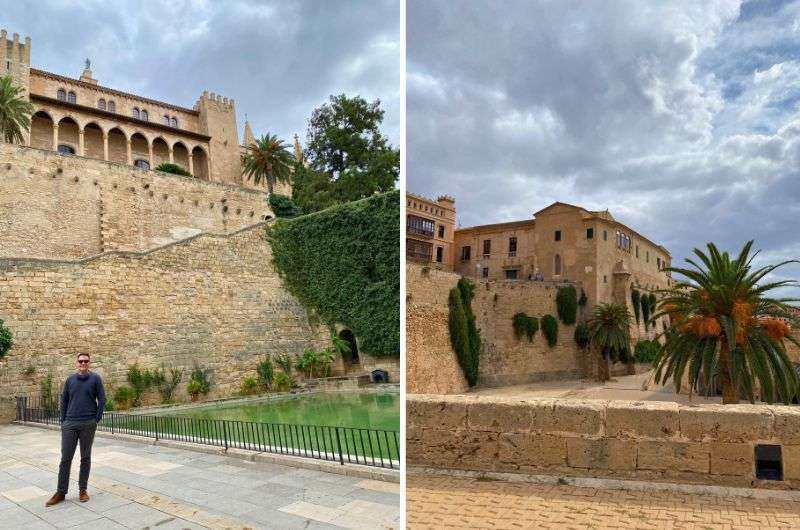
Palma de Mallorca is so great that everyone wants to see it...
Palma de Mallorca airport to city center in just 10 minutes
Palma de Mallorca airport (airport code PMI) is located very close to the city center—about 8 km (5 mi), which is an easy 10-minute drive. Everything about arrival is straightforward, including getting onto the highway that takes you straight to town.
That’s if you rent a car directly at the airport and not at one of the many rental car companies with a detached parking lot. Taking the shuttle to the rental company will extend your trip to the city center by an hour or so. Trust me, pay that little extra to get your car directly from the airport terminal in Palma.
Oh, and get a small car. Roads and especially parking spots in Mallorca are miniature! It’s kind of cute really, unless you actually want to get somewhere. I rented a BMW X2 and it still was too big for Mallorca!
Day 1: Discovering Palma de Mallorca–The Vibrant Capital of the Balearic Islands!
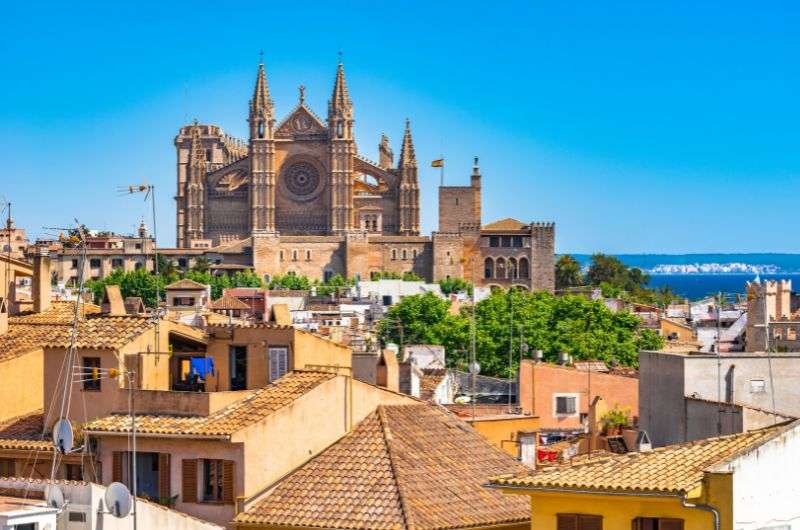
The weekend in Palma can begin!
Main sites visited on day 1: Royal Palace of La Almudaina, Mallorca Cathedral, Palma port, Bellver Castle
Restaurant tips: La Caña - xiringo urbano | Marina Bay Palma | Restaurant Botànic (for dinner)
Further reading: Mallorca background | Top places in Palma | Best hotels in Mallorca
Your first day in Palma de Mallorca is the only full day you’ll actually spend in the city. The beautiful thing about Mallorca is that nothing is ever more than an hour’s drive away, so you should take full advantage of that and see the sights!
Here are the most amazing places that you have to see in Palma. All but one are walking distance from each other (though if you are big on walking, you can walk all the way to the castle as well).
Stop 1, Palma: Royal Palace of La Almudaina
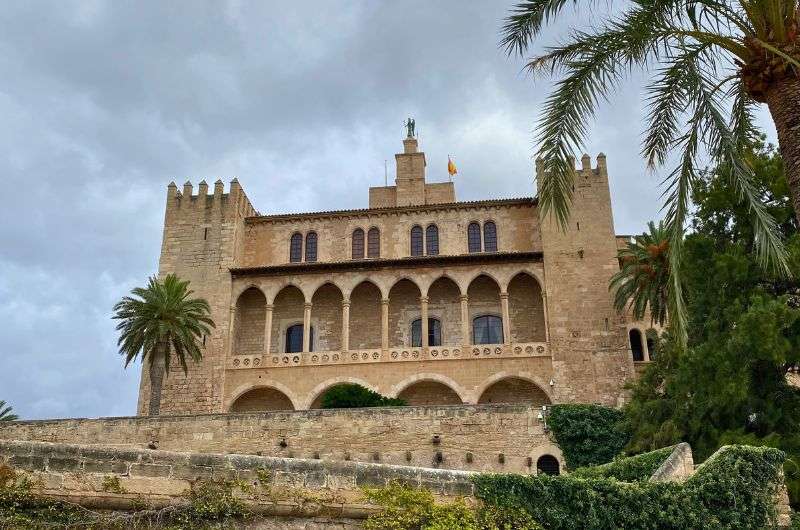
Royal Palace of La Almudaina
- Time spent here: 1 hour
- Opening hours: Open Tuesday to Sunday 10 am–7 pm, closed Mondays
- Price: EUR 7 + EUR 5 for audio guide or EUR 6 for human guide
- Official website: Royal Palace of La Almudaina official website
The Royal Palace of La Almudaina is right next to the famous cathedral, so you can’t miss it even if you're exploring Palma for the first time. It’s a great introduction to Mallorca and Spain's royal heritage, which is why I’m putting it as your first stop on your Palma itinerary.
Note: The Palace is closed on Mondays, so if you’re spending a long weekend in Palma, make sure to extend it before the actual weekend, not after. You’d miss out on some pretty cool attractions on a Monday.
You enter through the gate in the corner closest to the cathedral, facing the sea. We wandered around on our own with an audio guide, which was good enough with some interesting insights and we just moved on when we wanted, which I prefer to getting chaperoned around by a guide. The self-guided tour inside the palace took us about 45 minutes.
What used to be a Moorish stronghold is now an official residence of the Kings of Spain. You can even see the King’s desk and feel like part of the Spanish royal family! Moorish architecture is always stunning (for the best of the best of it, see my Best Places to Visit in Andalusia and be prepared to get your mind blown), though the Royal Palace of La Almudaina is much less intricately decorated than a typical Moorish palace, as it’s mix of Moorish and Gothic styles. Quite minimalist for a palace, actually.
You can admire about 20 different rooms and the view of the harbor, with the bonus of having a place to cool off if it is one of Mallorca’s hotter months. And that can apparently be any month, really—I went at the end of October last time and it was still scorching hot (Mallorca really is a year-round destination)! Don’t skip the palace’s gardens, which used to be used to grow vegetables for the royals.
Stop 2, Palma: Palma de Mallorca Cathedral
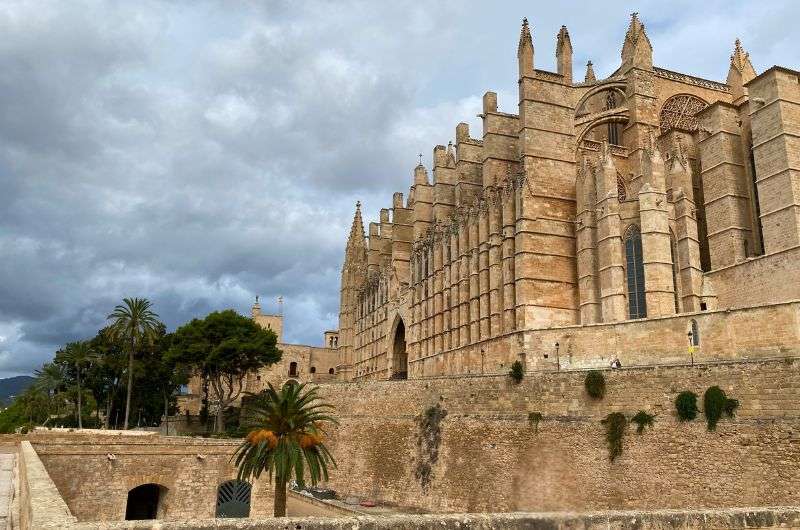
Mallorca Cathedral
- Distance from last stop: Right next door
- Time spent here: 30 minutes to 1 hour
- Opening hours: April to October: Monday to Friday 10 am–5:15 pm, Saturdays 10 am–2:15 pm, closed Sundays. Winter hours Monday to Saturday 10 am–3:15 pm.
- Price: EUR 10 for basic visit + EUR 5 for audio guide, EUR 25 cathedral + terraces, EUR 30 for guided tour
- Official website: Mallorca Cathedral official website
Next up, quite literally, because it’s next door to the palace, is Mallorca Cathedral (officially Catedral-Basílica de Santa María de Mallorca and locally known as La Seu Cathedral). If you looked at least one photo of Palma before you travelled there, you’ve seen the cathedral. It’s truly a landmark, it’s huge, and it sits in the prime position right near the port.
It’s monumental—its central nave is 44 m (144 ft) high, making it one of the tallest cathedrals in Europe. Inside you can find the largest rose window offering a breathtaking light play. There is also a modern touch to it—after an extensive fire, the Cathedral had to be renovated—by the hands of Antoni Gaudí himself.
Tip: Gaudí is synonymous with weird, organic-looking architecture, and he went all out in Barcelona. Read about him and decide if you need to see his main masterpieces in my Barcelona guide.
I didn’t get a chance to visit the cathedral terraces, but I think it would be worth grabbing those tickets for some pretty views and unusual perspectives, even though they cost EUR 25. As far as I can tell, they are only available as sunset tours on some days, so you’ll need to check the availability for your travel dates and get your timed tickets online in advance.
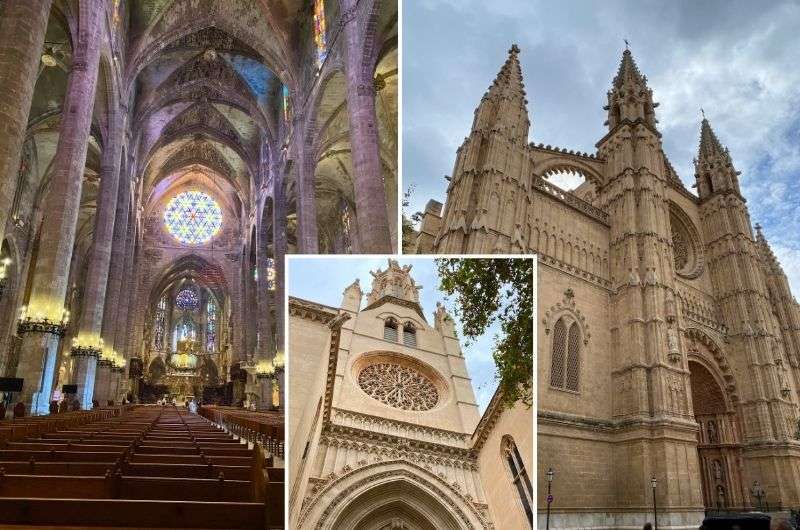
La Seu Cathedral is another proof of Gaudí's genius
Basic cathedral tickets are also a bit steep at EUR 10, and you pay EUR 5 for an audio guide if you want one. The audio guide tends to ramble on and on, so unless you are really interested in history, maybe just use your eyes and make do with the simple signage throughout the cathedral (in English too). Your cathedral ticket also gets you into the Museum of Sacred Art next door, which, as you’d expect, is full of religious art—take it or leave it.
You’ll spend 30 minutes to an hour at Palma Cathedral, depending on which type of visit you choose.
Stop 3: Lunch at Palma’s port

Time to fill your stomachs with delicious seafood
- Distance from last stop: 400 m (0.3 mi), a 5-minute walk
- Time spent here: 1.5 hours including lunch
It’s only midday and you’ve seen Palma’s main tourist attractions! That sounds like it’s time to celebrate with a good lunch. Take some time to stroll in the streets near the palace and the cathedral, check out the parks near the Mediterranean Sea and the historical buildings lining the main avenues. Then, head toward the port where you’ll get the ultimate vacation vibes.
There are many restaurants to choose from since you’re in tourist central. I always take a quick peek at Google Maps reviews so I know I’m not stepping into a tourist trap with high prices and low standards.
Restaurant tips in Palma
One place with a pleasant setup is La Caña - xiringo urbano, a Spanish restaurant with outdoor seating. Or, if you want to be really close to the boats, head into the heart of the port to Marina Bay Palma.
Stop 4: Bellver Castle
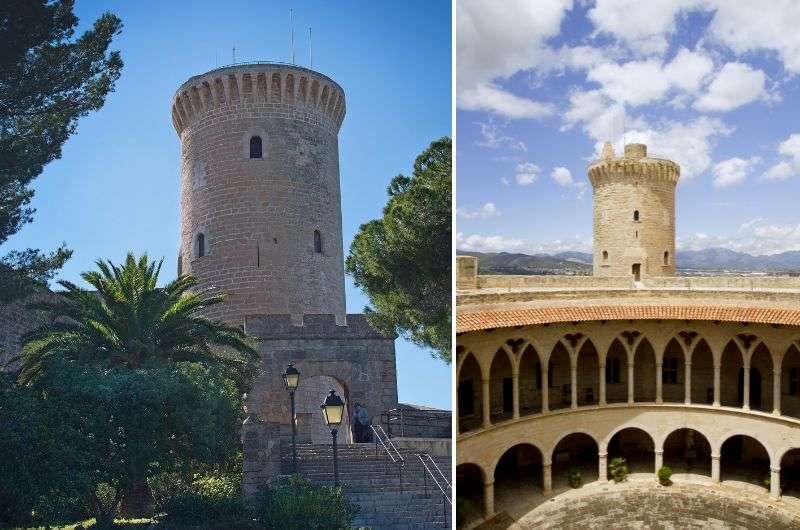
Bellver Castle
- Distance from last stop: 4.5 km (2.8 mi), a 15-minute drive
- Time spent here: 2 hours
- Opening hours: Tuesday to Saturday 10 am–7 pm (closes at 6 pm in October to March), Sundays 10 am–3 pm, closed Mondays.
- Price: EUR 4, audio guide is free on your own phone
- Official website: Bellver Castle official website
After lunch in Palma’s city center, head west out of the city to Bellver Castle. Who doesn’t like a castle with panoramic views and a killer hilltop location?? I do. Plus, fun fact, it’s Spain’s only round castle.
To get there, you’ll drive up Carrer Castell de Bellver, winding your way up the hill. There is parking at the top, but fair warning: parking spaces are limited. If you’re out of luck, you might find yourself hoofing it up the many, many stairs from the main pedestrian entrance on Carrer de Bellver, which—just to keep you on your toes—is in a totally different spot from the road you'd drive up. Or, if you're feeling adventurous, you could skip the parking drama and just walk from the start. Either way, consider it your workout for the day.
Once you’re there, you’ll be greeted by a unique circular fortress—one of the only ones like it in Europe. Bellver was originally built in the 14th century as a royal residence, and you can practically feel the history oozing from its thick stone walls.
Pro tip: Get your tickets at the ticket desk before the last stairs to the castle (by the parking lot)! A lot of people missed that slight detail and had to go back down and then up again, and you could tell they weren’t happy. I was, because I knew where to get tickets and they only cost EUR 4.
The castle now houses the Museu d'Història de la Ciutat, where you can explore Palma’s past through a series of exhibits about the city’s history, from Roman times right up to the modern era. There’s also a dedicated space for temporary art exhibitions, adding a nice cultural touch to your visit.
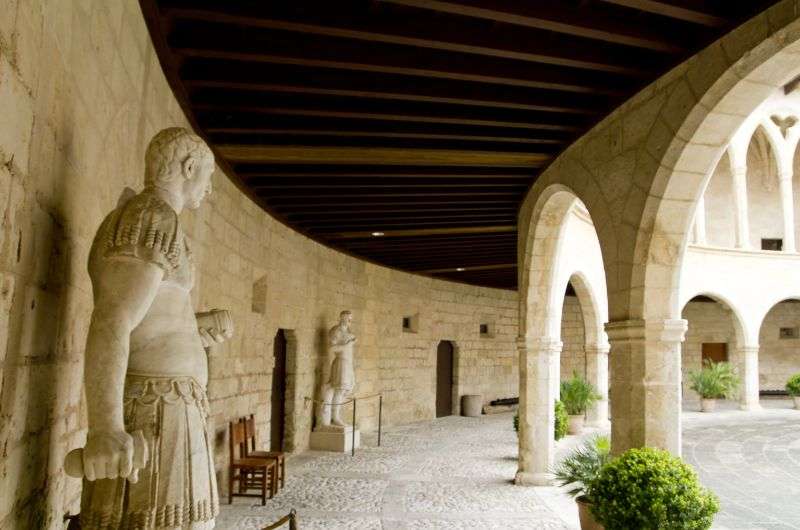
Roman history will breathe on you in Bellver Castle
You don’t need a guide and can wander around the three floors on your own with the audio guide you can download onto your phone. Discover old pottery, paintings, sculptures, but most of all, make sure to make it to the rooftop to take in the wonderful views of Palma, the bay, and the mountains! Oh, the mountains… You’ll see a lot more of those tomorrow, stay tuned!
But the castle is just the beginning. Bellver is set in a sprawling forested park, crisscrossed with trails that invite you to wander and explore. As you stroll, you’ll come across various sculptures and old buildings tucked among the trees, as well as many more views. Take some time to walk around; overall, including the castle and museum, you can spend 2 hours up here easily.
Stop 5: Dinner and nightlife in Palma de Mallorca
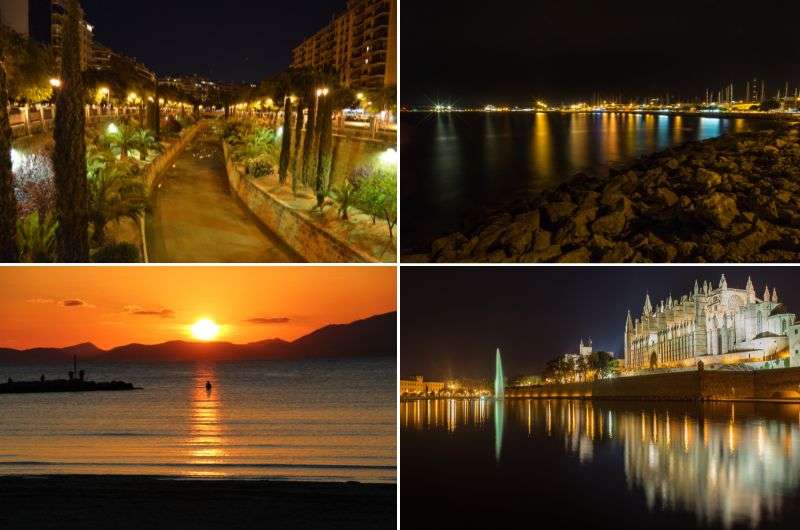
...and now you can just soak up the atmosphere of the evening in Palma
Palma is not just cobblestoned streets and beautiful medieval buildings. When the evening rolls around, it turns to busy, vibrant city full of life. From super-chic bars to wild party clubs, the nightlife in Mallorca is an experience. I prefer a good dinner and maybe a drink at the hotel bar, but there are options to suit anybody’s taste.
During one of your evenings in Palma, you shouldn’t miss Santa Catalina, a picturesque part of the city with traditional houses and buzzing streets. It’s home to amazing restaurants, cafés, and bars. And this one’s for the beer lovers out there: As a proper Czech, I couldn’t possibly leave out the most important experience—beer bars. In Spain they are called cervecerias. Cerveceria Tramuntana offers over 200 different beers to try!
Or, if you want to stay within the smells and sounds of the sea, walk along Paseo Maritimo, the promenade by the port. Exploring Palma is fun no matter if it's day or night.
Secret tip: Last but not least, a little hidden gem, if you can even believe those words coming from my, um, fingertips: Es Baluard Contemporary Art Museum. Yes, you’re reading right, it’s a cocktail bar inside a museum. The museum itself is worth a look if you have extra time (exhibits close at 8 pm most nights).
Just don't go too crazy and head to bed early enough that you're able to be up and out again in the morning! Mallorca road trip day lies ahead!
Day 2: Exploring Sóller, picturesque villages, and the Tramuntana mountains
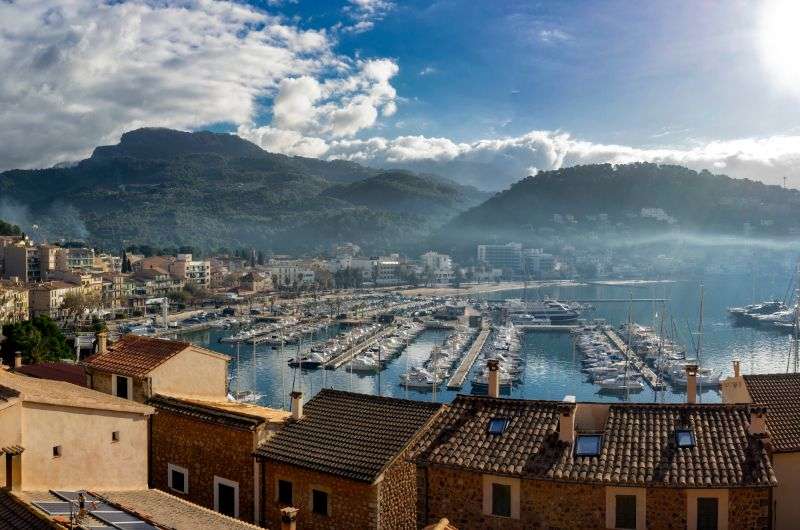
Port de Sóller with the Tramuntana Mountains in the background
Main sites visited on day 2: Sóller Old Town and Port, historic wooden tram, Fornalutx, Sa Calobra, optionally Santuari de Lluc
Restaurant tips: Restaurante Luna 36 (Sóller)| Can Karlito (Sóller) | Nunu (Port de Sóller) | Groenk Bistro & Grill Fornalutx
Further reading: Top places in Soller | Best places in Mallorca
Today, you’ll head outside of Palma on a day trip to explore my favorite town in Mallorca: Sóller. It’s way up across the Serra de Tramuntana mountain range, which probably sounds like a heck of a trip, but you can drive there in 30 minutes from Palma (27 km/17 miles). After a few hours in Sóller, you’ll explore the seriously curvy roads in the Tramuntama mountains, stopping at a picturesque village on the way. A little car-sickness inducing road trip, if you will.
Alternative route: A more adventurous alternative to driving to Sóller is to take the scenic way through some of the most charming mountain villages in Mallorca: Valldemossa and Deià (some people like to head to nearby Cala Deià to explore the rocky beach down there as well). It’ll double your route in time and distance, and take you through even more mountain roads, but I wanted to tell you it’s an option.
My two cents worth is that unless you have some sort of unhealthy village obsession, you can skip these other two villages, since I already have another cute village in store for you for later and I feel like they all look the same anyway.
Sóller's layout: A town split into two
Before I start listing all the things you need to see in Sóller, I think I need to explain the layout of the town, because I myself was slightly confused with it at first:
Soller’s Old Town is on a hill about 5 km (3 miles) above the port, which is called Port de Sóller. They are one city, but kind of aren’t, since half of the city is up on a hill and half is way down by the beach.
The port has your typical beachy vibes and is lined by restaurants and hotels and not much else.

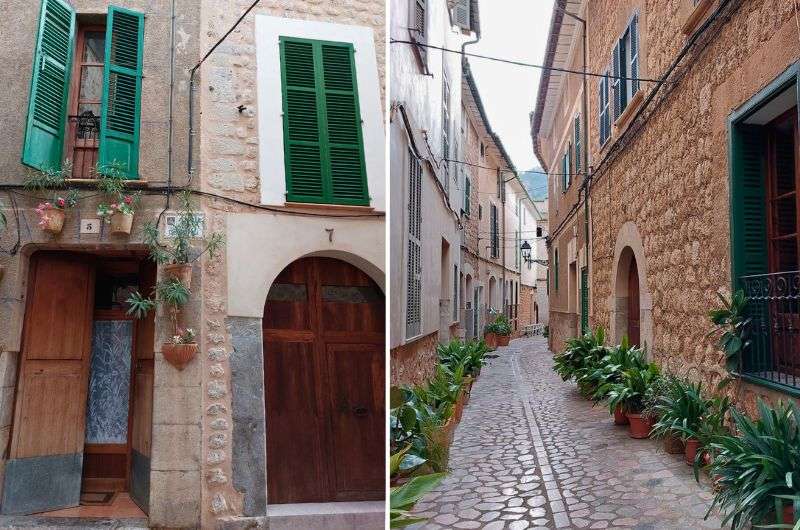
Sollés’s Old Town alleyways are as charming as they get without being too kitchy
The town up on the hill is where you’ll find the gorgeous main square, the pretty, stone buildings, much better hotels and tons of charm (and restaurants and shops, too).
A wooden tram goes up and down between the two throughout the day, 1–2x per hour. This is a mandatory thing to do in Sollér.
Parking in Sollér
Sollér is dotted with small parking lots with even smaller parking spots, and you may need to try your luck at more than one before you find a place to fit your car. You usually need to pay at the parking machine, which is straightforward. We hilariously parked at one that honored siesta hours in the middle of the day! So, it was a paid parking lot most of the time, but you could stay there for free during siesta.
Port Soller also has a few parking garages, which sounds easier, but since they built the garages to fit minicars, getting in and out can be a challenge.
See my Google Maps list with all the places of interest mentioned in this itinerary
Day 2, stop 1, Sollér: Old Town
- Distance from Palma: 27 km/17 miles, a 30-minute drive
- Time spent here: 1.5 hours in the Old Town, 1.5 hours in the port
As I mentioned, Sollér Old Town (the part up on the hill) is where you’ll find the mesmerizing (but small) main square, Plaça de la Constitució, with the utterly fantastic church, Sant Bartomeu de Sóller, serving as the main focal point. It’s beautiful and you’ll certainly stop and stare at it. A lot.
The square is where the bulk of tourist life is centered. The square is lined with one restaurant next to another, with chairs and tables out front, perfect for said staring at the church.
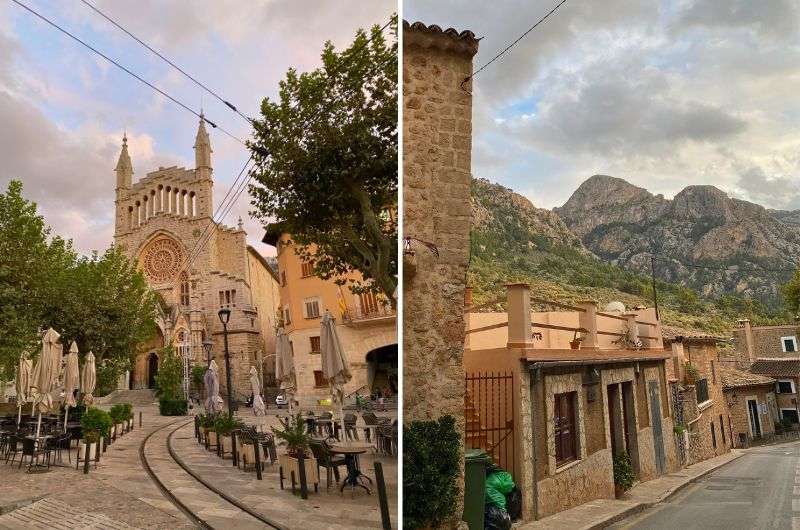
Soller’s Old Town—you can see the Sant Bartomeu de Sóller Church on the left
I don’t think anyone ever sits inside unless you’re there for a torrential downpour. I know this because I was there for one, but it turned out to be a good thing—once everyone piled inside, it was like we were one big, happy, slightly wet family!
In the middle of the square is a fountain and in the evenings it’s where people sit around, kids run around, and it’s just cool like that. There’s usually also live music, so the atmosphere is always lively. But since your Mallorca itinerary calls for a morning visit, you’ll miss most of this excitement. Then again, who doesn’t like a lovely morning? Spaniards don’t, so things tend to be nice and calm before lunch, which also has a special vibe to it.
Tip: I already mentioned I think Sollér is the best base for Mallorca! Check out my full Mallorca itinerary for 7 days to see if you want to change your plans.
Cutting right through the middle of all this madness is the famous old wooden tram that goes up and down between the port and the old town. It dates back to 1913 and is Mallorca’s first electric tram line.
Branching out from the square are endless narrow alleyways that are so typically Spanish, with colorful potted plants outside every door. The best street for souvenir shopping is Carrer de a Lluna. Some of the roads are pedestrianized and chock full of shops of all sorts, perfect for aimless walking. Yes, even I do that sometimes, especially if I know a café stop is coming up soon.
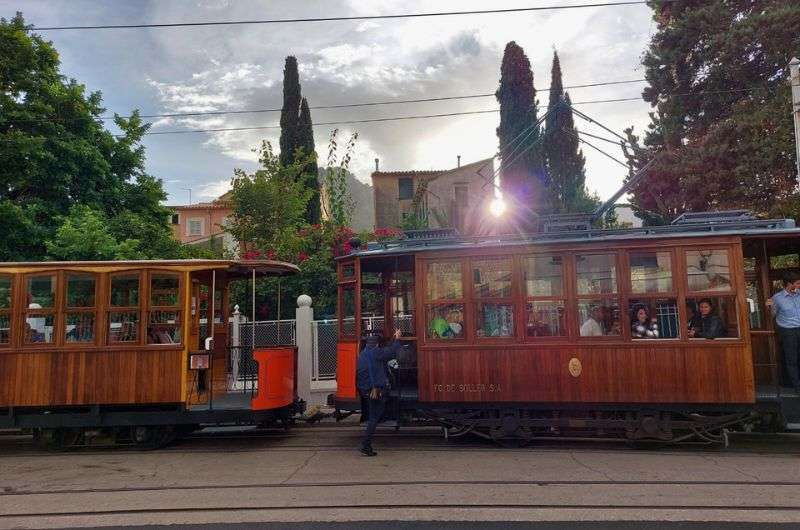
The historical wooden tram making its way from Old Town to the port
Others are actual roads that you will have the best time trying to turn the corner on. Sometimes I wished I was driving a slinky car because if the car was one inch longer and I just wouldn’t be able to fit! Also, “sidewalks” are about 2 inches wide, so watch your step and don’t get squashed by oncoming traffic. The cars are small, but you’re smaller.
Walk the Gran Via Avenue and the Cristofor Colom streets to witness the most splendid modernist residences.
Read more about what I loved in Soller.
Day 2, stop 2: Exploring Port de Soller
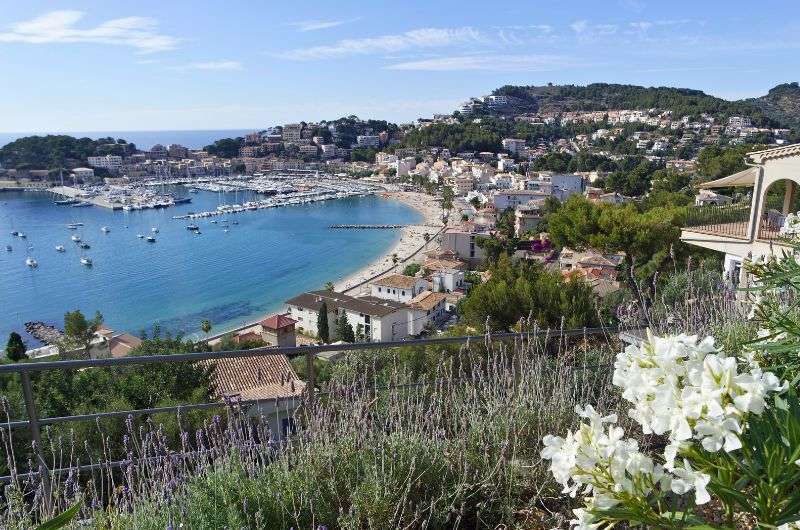
Looking down at Port de Soller and the beaches there
- Distance from last stop: 5 km/3 miles, a 15-minute trip on the old tram
- Time spent here: 1.5 hours in the Old Town, 1.5 hours in the port
Next, it's time to head down to the port. Hop on the wooden tram to get down to the port.
Where do you catch the tram in Soller?
The tram departs just behind the church once or twice an hour (there is a schedule outside the station). You don’t need to do anything or go inside the station at all, that’s for the people that want to take the train to Palma.
The trip down to the port takes about 15 minutes and it makes several stops. There are two stops down at the port, one on each end of the beach.
Tram tickets are bought in cash once you board the tram. The attendant walks around and sells tickets. On my last visit the price was an extortionate EUR 8 one way.
There’s nothing specific you need to do in the port besides taking a walk along the beach or staring at other people’s boats or going swimming in one of the two beach areas. The water is shallow and there are sun beds available for hire on parts of the beach. It’s not a beach to write home about, but it gets the job done if you just can’t wait to take a dip in some salty water.
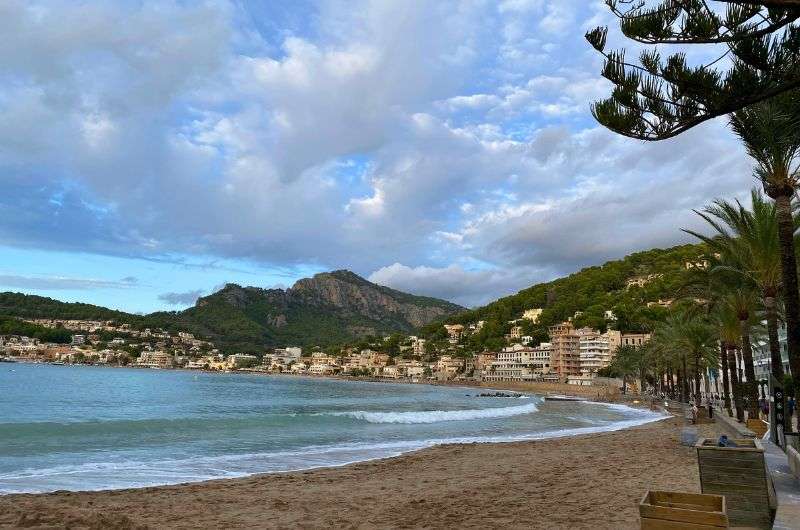
Fancy a walk on the beach?
Secret tip: You’ll notice that the port is almost enclosed by the surrounding cliffs. If you want some great views out to the open sea, I recommend taking a little walk up the cliffs through the winding streets on the northern side of the port. Aim for Plaça de Santa Catarina and behold—the waves crashing into the rocks right below you!
This is also where the entrance to the almost-secret maritime museum is located. Google Maps has finally taken note of its existence, so I can no longer claim I’m the only person that found it. It’s free and nice. They have an English packet of information at the reception desk, it only takes maybe 15 minutes to get through, so you might as well go. Even if it’s just for the views of the port and the open sea.
Day 2, stop 3: Fornalutx village
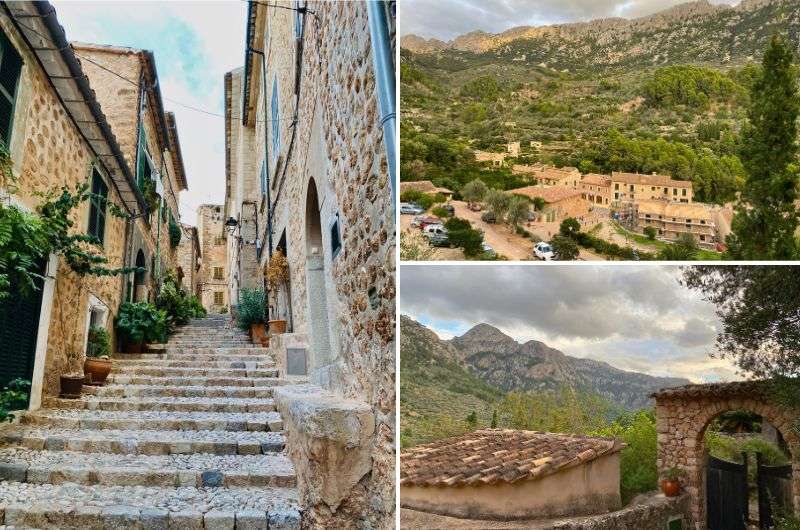
Fornalutx village
- Distance from last stop: 6 km/3.6 miles, a 20-minute drive on winding roads
- Time spent here: 45 minutes
You don't need more than a few hours in Sollér, so once you feel like you've seen it all, set out on a little scenic drive through part of the Tramuntana right outside of Sollér. You’ll first stop at one of the uber cute villages, Fornalutx,
The drive to Fornalutx from Soller’s Old Town only takes 15–20 minutes. And even that short drive will have you rubbernecking around every bend because the views start instantly. Parking is tight in Fornalutx, but Google Maps will help you locate a parking lot. You may need to try more than one before you find a spot.
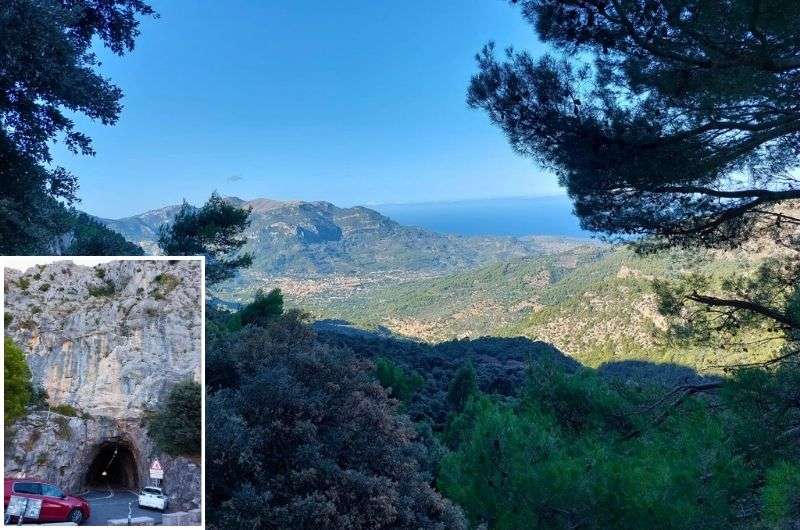
Driving through the Tramuntana gets you amazing views pretty quickly, plus the odd tunnel or two
Fornalutx is undeniably one of the prettiest hilltop villages close to Soller, but since it’s also referred to as “the most beautiful Spanish village”, you can gauge how many people visit it. And try to park in it.
It was originally a Moorish farmstead. The current state of the village formed after the Catalan conquests in the 13th century. I recommend visiting the town hall with its 17th-century defense tower and the gothic church with a baroque touch (off of the main square, Plaza de España). But even without looking for a particular landmark, you’ll enjoy getting lost in the countless alleys, walking up and down stairs leading to hidden gems between the stone houses and getting glimpses of mountains from every corner.
Personally, I think the village is nice, but there’s nothing to keep you busy for more than 30 minutes unless you park it at one of the restaurants. The restaurants are mostly very good though, so it’s a perfect spot to grab lunch.
Day 2, stop 4: Cúber Reservoir
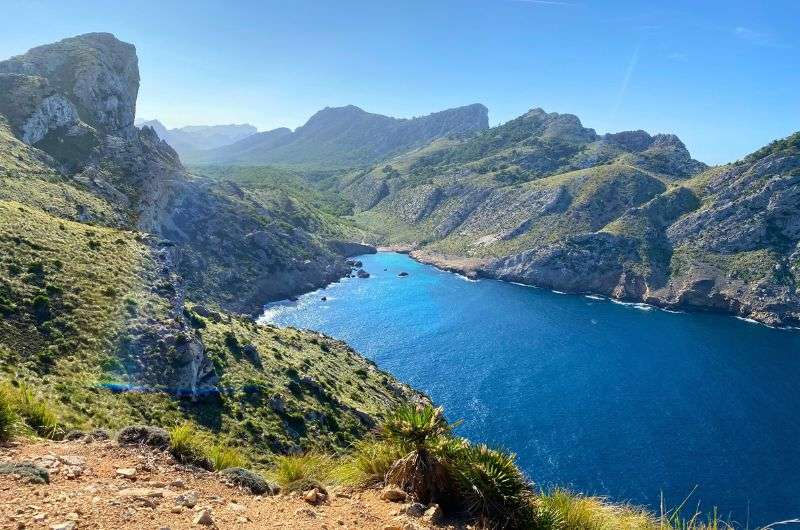
Cúber Reservoir
- Distance from last stop: 15 km/9.5 miles, a 20-minute drive on winding roads
- Time spent here: 20 minutes
From Fornalutx, drive another 20 twisty, turny minutes to Cúber Reservoir. Don’t forget to stop just before the tunnel at this epic viewpoint. You may be getting some views from the passenger seat, but your driver sure hasn’t had time to take a proper look!
There are a couple of tiny parking lots just before you get to Cúber, so keep an eye out for a spot. It’s free.
Cúber Reservoir provides water to Palma de Mallorca, so you’ve probably had a drink of it by now. It’s a manmade lake that’s just a pretty stop on the way to Sa Calobra.
You can either just get a glance and walk to its shores or walk the 4 km (2.5 mile) trail around it, but it’s very flat and considering the lake is surrounded by mountains, gives you the same view over and over again.
Day 2, stop 5: Sa Calobra
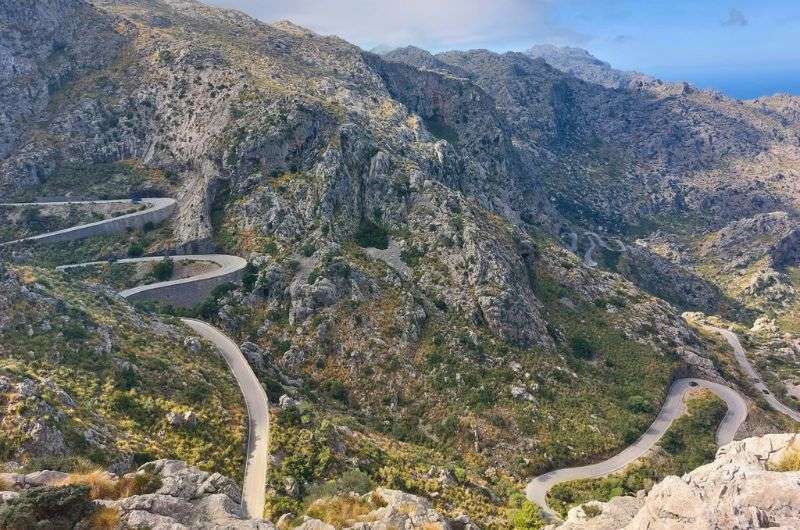
Ready to drive down to Sa Calobra? This is the view you get when you stop at this parking lot and walk through the little tunnel
- Distance from last stop: 17.8 km/11 miles, a 25-minute drive
- Time spent here: 1.5 hours including the drive down and back up
Last up (or rather down) on today’s itinerary is Sa Calobra, a tiny beach in between sky-high cliffs that you get to through a series of pedestrian tunnels carved into the mountain.
A big part of the fun is just getting there: You continue driving along the road from Cúber for just 7 more minutes, and just when you thought it can’t get any twistier, it does. Turn off the main road at the fork that leads down to Sa Calobra.
If you look at a map, you’ll see why I say the journey is the destination on this one (I like the beach too, but seriously, take it all in!). The crazy curvy, narrow road provides fantastic views down to the shore, and a great driving lesson in one.
Make sure to stop just above the most visually stunning section of the road and stare at the other cars driving on it from this parking lot. You’ll notice cars parked along the road as well, because the parking lot will be absolutely full. Just stop where you can, I promise this little stop is worth it!
Walk through the tunnel right after the little café just across from the parking lot and walk onto the rocks to the right of it... you’ll get fabulous views and have a fun time clambering over the rocks.
About a 20-minute drive down from the viewpoint, you’ll get to the official Sa Calobra parking lot. It’s huge by Mallorca standards, so you’ll always find a spot. You pay per minute, but it comes out to around EUR 3 per hour.
You walk down to the beach from there, it’s only about 10 minutes until you reach the tunnels, just follow the crowds. Ignore the little tourist area down there, it’s awful. There’s a handful of “restaurants” serving “food” for ridiculous prices. I recommend saving your appetite for anywhere but here.
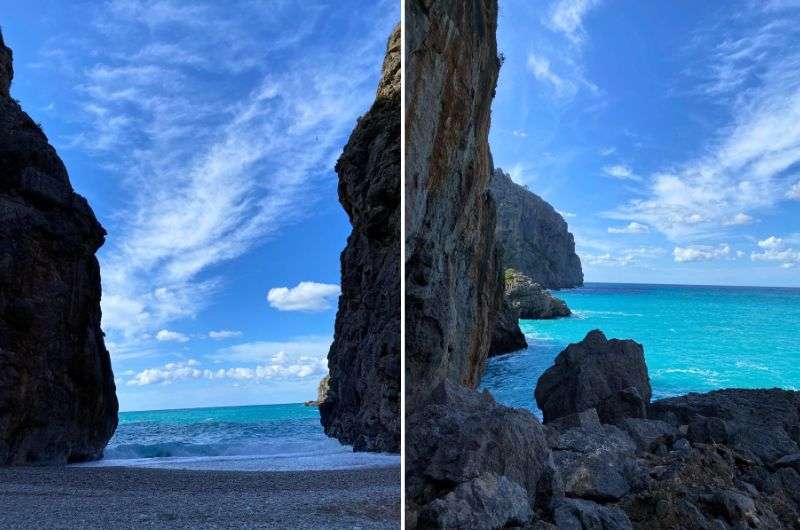
Sa Calobra beach—perfect for Instagram photos!
It’s only a short walk through the dark (and slippery!) tunnels and to the beach. You can’t miss it, it’s only about 15 m (50 ft) wide, with the tall rocks framing it on both sides, with the stream coming from the mountains to the sea forming a small lake just behind it. People go for a swim, but I preferred to just look at the views and head back when I’ve had enough.
Driving back to Palma de Mallorca
When you are ready to head back to Palma, you can go back up the same way you came down to Sa Calobra, and then either head back through Sollér or just keep going to Lluc and then down to connect to the highway at Inca. Both routes work out to be about the same distance and time—the drive to Palma will take about 1 hour from the Sa Calobra turnoff.
Bonus stop: If you somehow end up with extra time on your hands, you can stop at Santuari de Lluc—Mallorca’s most important pilgrimage site. The basilica closes at 7:30 pm, while the botanical garden closes at 7 pm. There’s also a restaurant (and a hotel).
Day 3: Reaching the end of Cap de Formentor, sightseeing in Alcúdia, and relaxing on Muro Beach
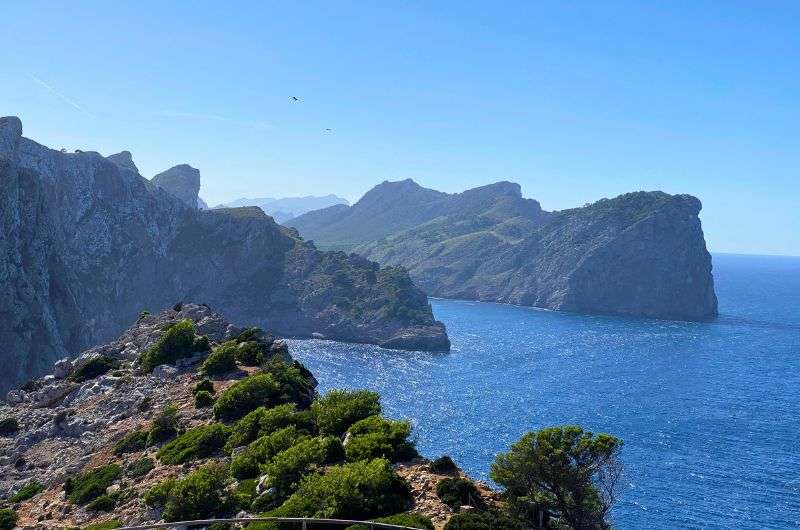
Cap de Formentor view
Main sites visited on day 3: Cap de Formentor (Mirador de Es Colomer, Albercutx Watchtower, Cala Figuera or Cala Murta, the lighthouse), Alcudia Old Town, Muro Beach
Restaurant tips: NATUR POKE Puerto Pollensa | Maca de Castro (Alcúdia) | Restaurant Celler Ca'n Costa Alcúdia
Further reading: Mallorca’s Best Beaches | What not to miss in Alcudia | 7-day Mallorca itinerary
Today you’ll get your flip flops blown right off at Mallorca’s most spectacular viewpoints in the northernmost part of Mallorca on Cap de Formentor. Then, finish your day walking the old fortress walls in Alcudia’s Old Town (and maybe fit in some beach time). And you thought all you had time for is Palma…
Day 3, stop 1: Cap de Formentor viewpoints, lighthouse
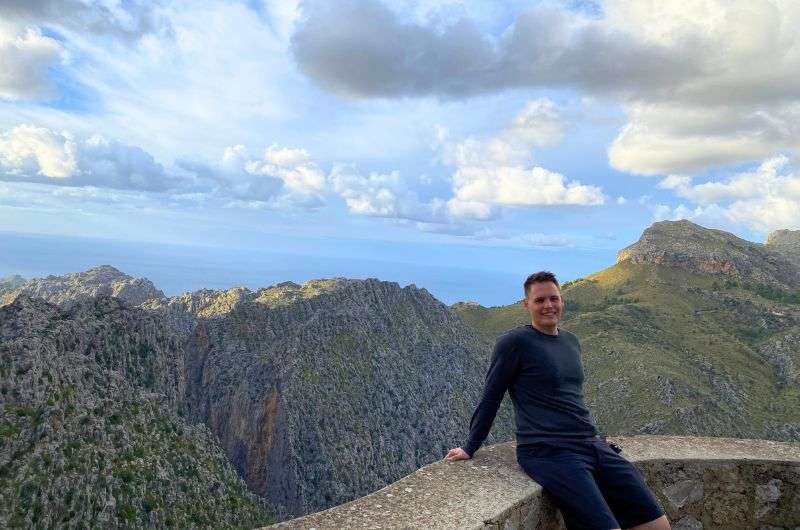
Stop your car and view the view!
- Distance from Palma: 63 km/39 miles, a 50-minute drive (to the start of the Formentor drive)
- Time spent here: 2–3 hours
The drive to this incredible corner of the island is only an hour long. You’ll be driving on the highway ¾ of the way to Cape Formentor, so it’s an easy trip. Things get a little more exciting once you reach the mountains.
The road from Port de Pollença to the lighthouse at the end of the cape is only 25 km (15 miles) long, it will, at the very least, take you 2 hours with all the stopping and ogling and slow driving, trying not to hit or be hit by cyclists. Unless you’re visiting in the winter, you’ll likely get stuck in a long line of vehicles at the very end of the road near the lighthouse. Everyone is waiting to park, or get out of the parking, and it can be frustrating.
Note on restricted access: You can’t drive on the roads on Cape Formentor between the mid-June to mid-September. This regulation is in place to prevent overcrowding, which you’ll understand once you see the roads. That means that between 10 am and 10:30 pm in the summer, you have to leave your car and get on a bus in Port de Pollença and see the cape that way. It stops in all the main places I mention.
You’re first stop will be Mirador de Es Colomer, a viewpoint that’s so easy to visit that it doesn’t seem fair that it has such gorgeous views. The drama of the bare, grey cliffs jutting up from the sea is pretty darn awesome.
You park (for free) right at the start of the manmade walkway. It’s only a 300 m (980 ft) walk along the cliffs, but since you’ll be wanting to stop and stare and take photos every two seconds, you can easily spend 30 minutes here.
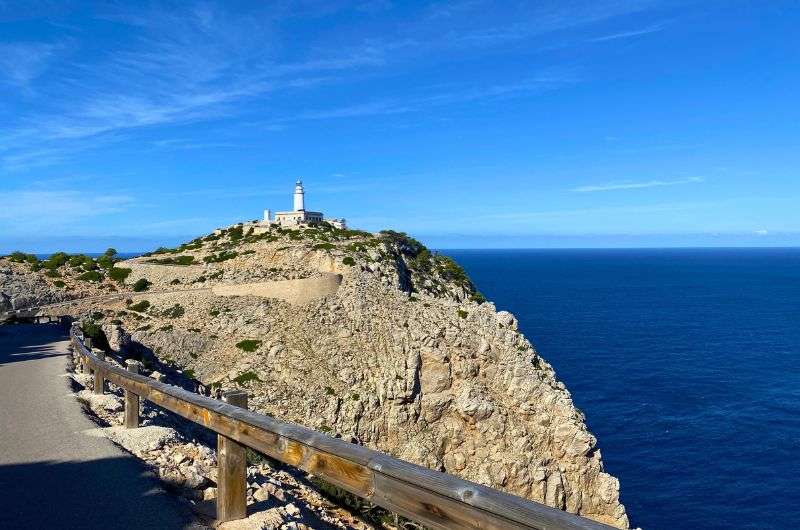
The picturesque lighthouse at the end of Cape Formentor
There’s a little shack selling refreshments at the start of the trail. Don’t get startled by a random goat or two that like to hang out there and then pop out of the bushes unexpectedly.
If you want to see the same views but from higher up, drive up from the parking lot for about 7 minutes to the watchtower on the hill. Leave your car at the small clearing and then walk the last 300 m (980 ft) to the Albercutx Watchtower. You’ll pass some not so nice ruins of buildings where graffiti and goat poop has taken over, and then you can actually climb the ladder up onto the top of the tower (at your own risk). Again, expect some garbage inside, but it’s a neat thing to do.
Once down the hill and out of the inevitable traffic jam at the parking lot exit, continue your drive towards the end of the cape.
If you feel like some beach time, good luck trying to park in the vicinity of Cala Figuera and either head down to the beach there, or, if you don’t like sharing with a hundred other tourists, take the donkey-filled walk to Cala Murta on the other side of the cape and feel like you’ve found something not everyone knows about.
Past this point, you’re only 7 km (4.3 miles) out from the Formentor Lighthouse at the end of the cape. You can’t visit the inside of the lighthouse, but you will get spectacular views from the base of it and even an overpriced snack and beer if you crave it.
There are always tons of people trying to park at the lighthouse, so you might end up parking on the road that leads up to it. If you get there and get stuck in a long line of vehicles, don’t even try to wait until the parking lot and just park in any space you can find on the road and walk the rest.
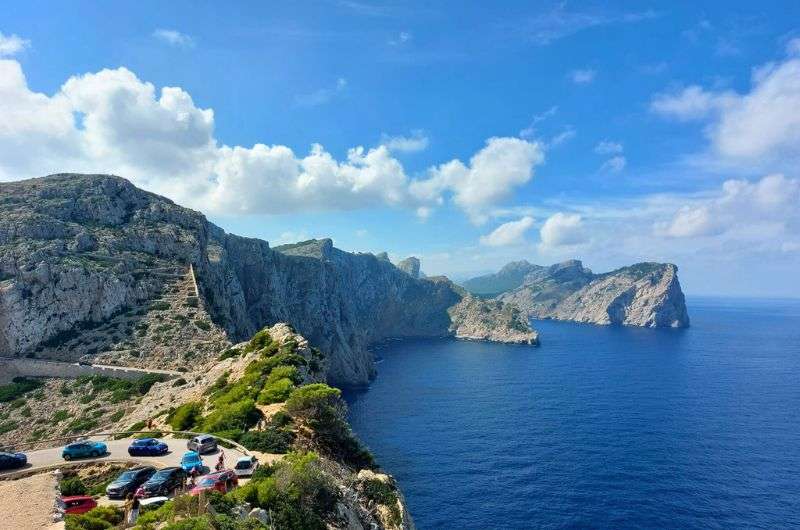
Looking back at the cape from the lighthouse at the beautiful scenery (and traffic jam of cars)
Lunch near Cap de Formentor
Once you manage to get all the way back from the lighthouse to Port de Pollença, feel free to stop for a healthy lunch and a really good coffee (that’s a big compliment coming from me!) at NATUR POKE Puerto Pollensa. It’s a little place right by the sea that deserves some attention. Otherwise just head straight to Alcudia.
Day 3, stop 2: Alcudia Old Town
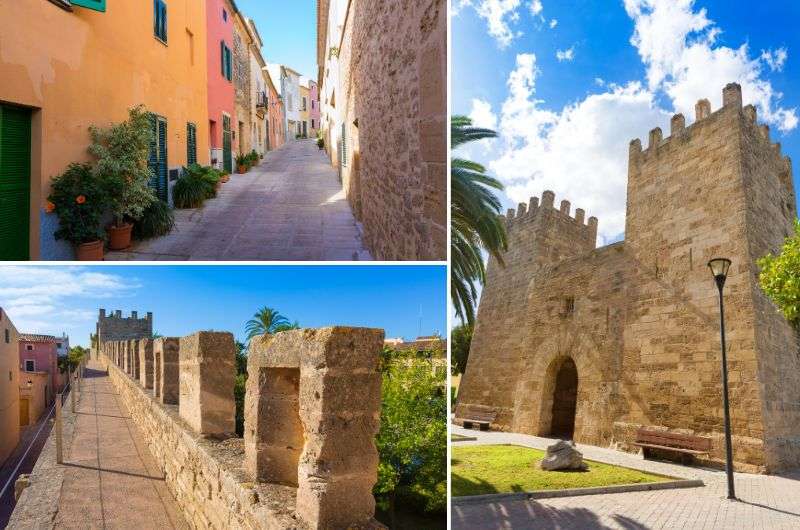
Alcudia’s Old Town
- Distance from Port de Pollença: 10 km/6 miles, a 15-minute drive
- Time spent here: 2–3 hours
Your final destination on the last day of 3 days in Palma itinerary (aside from heading back “home” to Palma) is Alcudia’s Old Town. It used to be a walled fortress, which is great for us tourists today, because you can walk on the remains of those walls.
Park in the parking lot on the northern side of the city and then start walking. You’ll see the way. Get off the walls at St Sebastian's Gate and head down the charming streets towards Plaça de la Constitució. Find more city gates and the church. Wander. The streets are pleasant, and you can even find some that aren’t full of crowds without trying that hard at all.
The Church of Sant Jaume was rebuilt in 1893 to a neo-gothic piece of art. Besides the church itself, you can visit the baroque Chapel of Sant Christ and the display up on the gallery, provided by the Alcúdia parish. The entrance is only EUR 1.
Alcúdia restaurant tip: Try this Michelin restaurant
Alcúdia is home to Michelin star chef Macarena de Castro. At her family-owned restaurant called Maca de Castro in Alcudia’s port, the most skilled interpretation of local flavor can be found together with a diverse selection of fine wines. Make reservations in advance. I told you Mallorca has some amazing restaurants!
If you want to stay in Alcúdia Old Town for your meal, try Restaurant Celler Ca'n Costa Alcúdia (lunch or dinner for EUR 15–30). It’s a small restaurant, right in the heart of the old town, with lovely rustic courtyard.
For more highlights in and around the city, see my Alcudia Guide.
Day 3, stop 3: Muro Beach
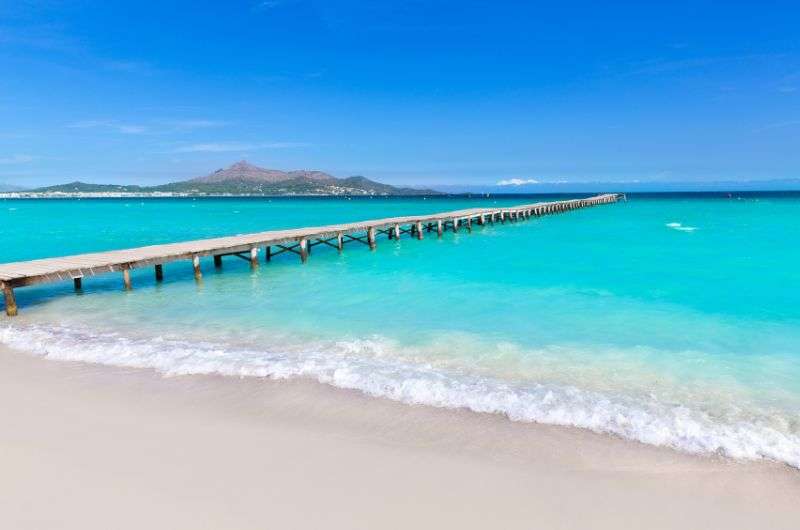
Playa de Muro
- Distance from Alcúdia Old Town: 5 km/3.5 miles, a 12-minute drive
- Time spent here: 1 hour, or more for beach bums
I’m not a beach bum myself, but come on, you need to allow for some beach time when on an island! You might as well make it a gorgeous, almost-white, soft-sand beach with turquoise waters that seems to never end—that’s Muro Beach, one of Mallorca's best beaches.
Muro Beach is near Port d'Alcúdia, which is the port section of Alcúdia. As is the case in Sollér, the two are a little ways away from each other; in this case, it’s about a 5-minute drive between them.
Muro Beach starts where Alcudia’s main beach ends, and it is very popular, but so long that it’s never too crowded. It doesn’t have a promenade, instead being lined by either residences or hotels—this is a beach you go to spend time on the sand. For shops, you’d need to get off the beach and onto the main road, though you can find a café or hotel restaurant that faces out to the beach here and there.
Parking is in any of the many side streets that lead to the beach. There are so many that you’ll always find a spot, for free. Check Google Maps for a spot on the beach that looks nice and head there. There’s a long, skinny wharf roughly in the middle of Muro Beach that is attractive for photos.
For the most part, Muro Beach is the best beach when you're looking for some lazy beach time. The waters are shallow, so you need to hike out to have a good swim, but you can channel your inner seal and just flop around in the warm shallows instead, posing for way too many Insta pics if that’s your thing.
Some sections of Muro Beach have rentable beach loungers, in others you can spread your towel on the sand the good old-fashioned way.
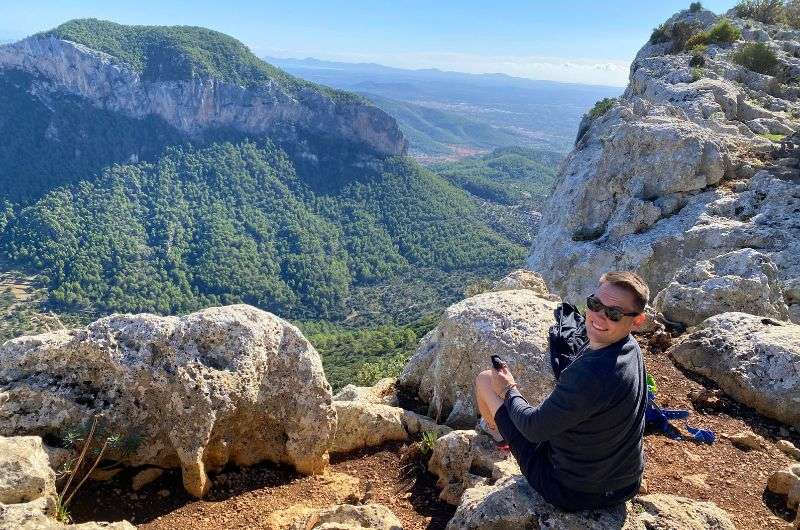
I'm not much of a beach person. I'm more of a hiking and enjoying the views kind of guy
The end of your 3-day Mallorca trip… or is it?
The drive back to El Llorenç Parc de la Mar Hotel in Palma de Mallorca takes 45 minutes. And that’s you have time for on your Palma de Mallorca 3-day itinerary. Still, you managed to see a lot, right? I think Mallorca is very much worth visiting even on a short trip like this, because it really packs a punch. And if this was your first trip, it certainly won't be your last!
If you want more, I’m happy to plan a whole week for you: See my 7-day Mallorca itinerary to add more cliffs, caves, and a completely new look at the eastern part of the island.
Sometimes, all you need to do is take the first step... I've filtered out the best hotels in Palma for you
Save it for yourself to come back to later, or share with your friends on social media!
Palma de Mallorca interesting facts
Mallorca is an interesting island, isn’t it? Oh, I’m telling you it is. Here are some fun facts about it, followed by your burning questions, all to make your visit more informed and pleasant.
- La Seu cathedral took nearly 400 years to complete
La Seu, Palma’s stunning Gothic cathedral, took almost 400 years to complete. And it’s still evolving! In the early 20th century, Antoni Gaudí himself added some finishing touches, including a giant wrought-iron canopy over the altar.
- Frédéric Chopin composed in a Mallorcan monastery
Did you know that the composer Frédéric Chopin spent a winter in Mallorca and composed some of his preludes here? In 1838, he and his lover, the writer George Sand, stayed at the Royal Carthusian Monastery in Valldemossa.
- Sóller’s pirate invasion of 1561 is re-enacted every year
In 1561, the town of Sóller faced a massive pirate invasion, with around 1,700 Berber pirates landing on its shores. The locals managed to fend them off in a dramatic battle. This event is commemorated each year in May with a lively re-enactment during the "Es Firó" festival.
- Mallorca enjoys over 300 days of sunshine each year
Mallorca enjoys over 300 days of sunshine each year, making it one of the sunniest spots in Europe. It’s no wonder the beaches are always calling!
- Mallorca has over 70 vineyards producing wine
Mallorca has been producing wine since Roman times, but its vineyards remain one of the island’s best-kept secrets. The local wine scene is booming, with over 70 bodegas crafting everything from rich reds to crisp whites.
- Rafa Nadal was born and raised in Mallorca
Rafa Nadal, one of the greatest tennis players of all time, was born and raised in Manacor, Mallorca. His training academy is based here, and you might just catch a glimpse of the legend himself when visiting the town.
- Palma has had several names over the centuries
Palma has gone through several name changes over the centuries. The Romans called it Palmeria, the Moors named it Medina Mayurqa, and today, it’s simply Palma.
FAQ 1: Is 3 days enough in Palma?
Yes, 3 days in Palma de Mallorca is enough to get a good feel for the city and even explore some of the island’s highlights. Palma is a compact city, and most of its main attractions, like La Seu Cathedral, the Royal Palace of La Almudaina, and Bellver Castle, can be explored comfortably in a day. With 3 days, you'll have a full day to delve into the city's history and culture and still have time for day trips to nearby gems like Sóller, the Tramuntana mountains, or the stunning Cap de Formentor.
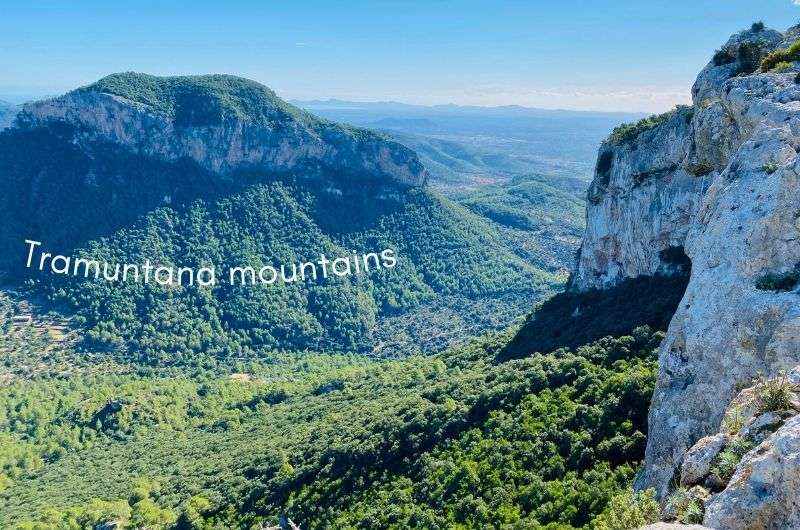
Tramuntana mountains
FAQ 2: Is there a lot to do in Palma?
Yes, Palma is packed with things to do for a day or two. Despite its relatively small size, Palma de Mallorca offers a wealth of activities and attractions that cater to all types of travelers. History buffs can explore the impressive La Seu Cathedral, the Royal Palace of La Almudaina, and the medieval Bellver Castle. Art lovers will enjoy the Es Baluard Museum of Modern and Contemporary Art, while foodies can indulge in Mallorca’s culinary delights at the local markets and tapas bars.
Beyond the historical and cultural attractions, Palma’s vibrant shopping districts, beautiful beaches, and lively nightlife ensure there’s never a dull moment. Plus, the city's harbor is a great spot for boat tours, and the nearby Serra de Tramuntana mountains offer incredible hiking opportunities.
FAQ 3: Why is Palma so expensive?
Palma’s high prices are largely due to its popularity as a tourist destination and recent efforts to curb overtourism. Over the years, Palma has become a favorite spot for travelers, which has driven up demand for accommodations, dining, and other services. This increased demand naturally leads to higher prices, especially during the peak tourist season.
Additionally, the local government has implemented measures to reduce the impact of overtourism, such as limiting the number of tourist beds available on the island. This has made accommodations even more scarce and, therefore, more expensive. The island’s luxury offerings, from high-end hotels to gourmet restaurants, also contribute to its reputation as a pricey destination.
FAQ 4: Is Palma a walkable city?
Yes, Palma is highly walkable. The city’s Old Town, where most of the main attractions are located, is compact and easy to explore on foot. You can comfortably stroll between La Seu Cathedral, the Royal Palace, and the numerous plazas and shopping streets without needing transportation. While attraction in central areas are all walking distance from each other, having a car can be helpful if you plan to explore the surrounding areas or take day trips outside the city.
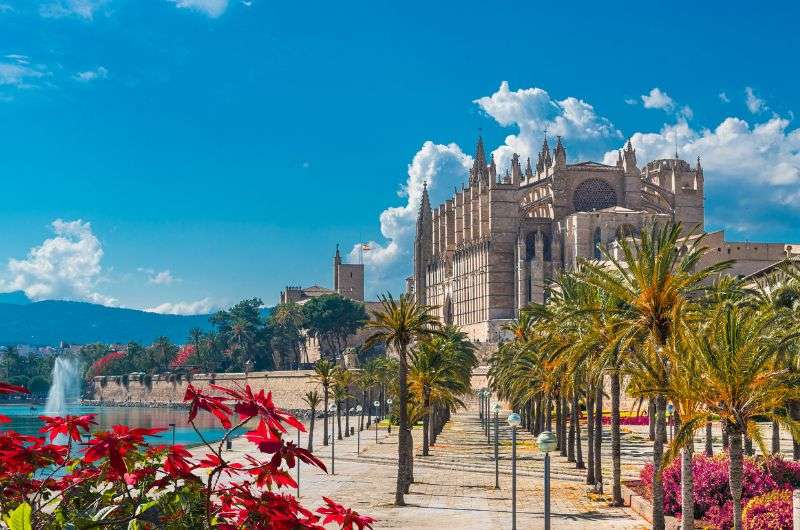
It is pleasantly walkable
FAQ 5: Is it worth getting a car in Mallorca?
Yes, renting a car for your Mallorca trip is highly recommended. Having a car gives you the freedom to explore the island’s attractions at your own pace, from the remote beaches and scenic drives through the Serra de Tramuntana mountains to charming villages like Sóller and Fornalutx. Public transportation is available, but it doesn’t always reach the island's more secluded spots, and bus schedules can be limiting, especially if you want to maximize your time on the island.
With a car, you can also avoid the crowds that tend to flock to the more accessible tourist hotspots.
FAQ 6: Is parking hard in Mallorca?
Parking in Mallorca can be challenging, especially in popular areas like Palma and the smaller villages. In Palma, parking spots are often limited, and the spaces are notoriously tight, which is why small cars are preferred. Public parking lots and garages are available, but they can fill up quickly, particularly during the peak tourist season, and you’ll feel like you’re driving a limo if you rent anything bigger than a small hatchback.
In the smaller towns, parking is even more of a hassle due to the narrow streets and limited parking facilities. It’s a good idea to arrive early in the day to secure a spot or be prepared to park a bit further away and walk.
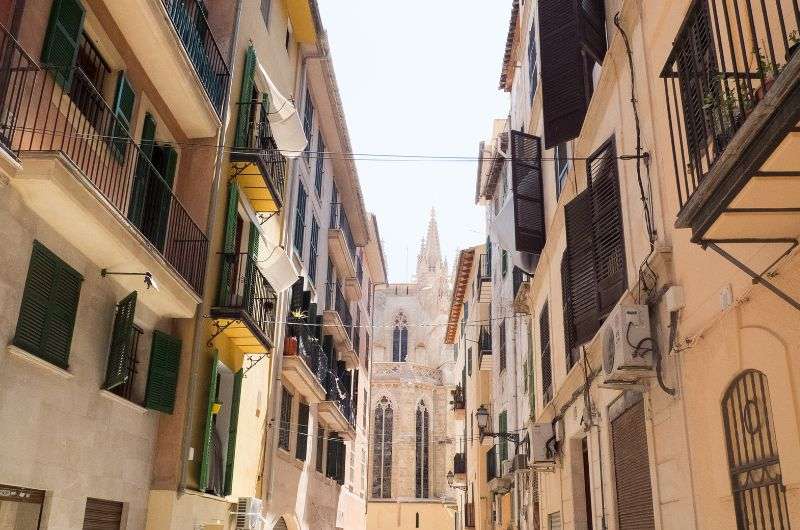
The narrow streets of Palma de Mallorca
FAQ 8: Is it easy to get around in Mallorca?
Yes, it’s generally easy to get around in Mallorca, but having a car makes it much more convenient. The island is well-connected by a network of roads, and most destinations are within an hour’s drive of Palma. The roads are in good condition, and the major routes are clearly signposted, making navigation straightforward. Plus, with a car, you can easily visit multiple spots in a single day without being tied to bus schedules.
You might also be interested in reading:
- 10-Day Spain Itinerary
- 10 Best Places to See in Mallorca
- 5 days in Barcelona (with day trips)
- How to Visit the Alhambra in Granada
- Andalusia Itinerary: Southern Spain in 10 Days
This post contains affiliate links. I earn a small commission if you make bookings through my links, at no additional cost to you. This helps keep this blog free, thank you!







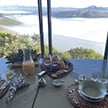


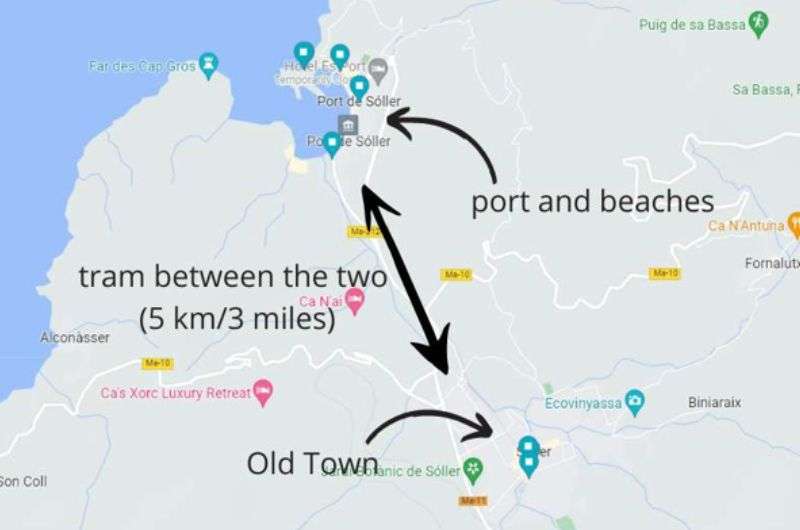
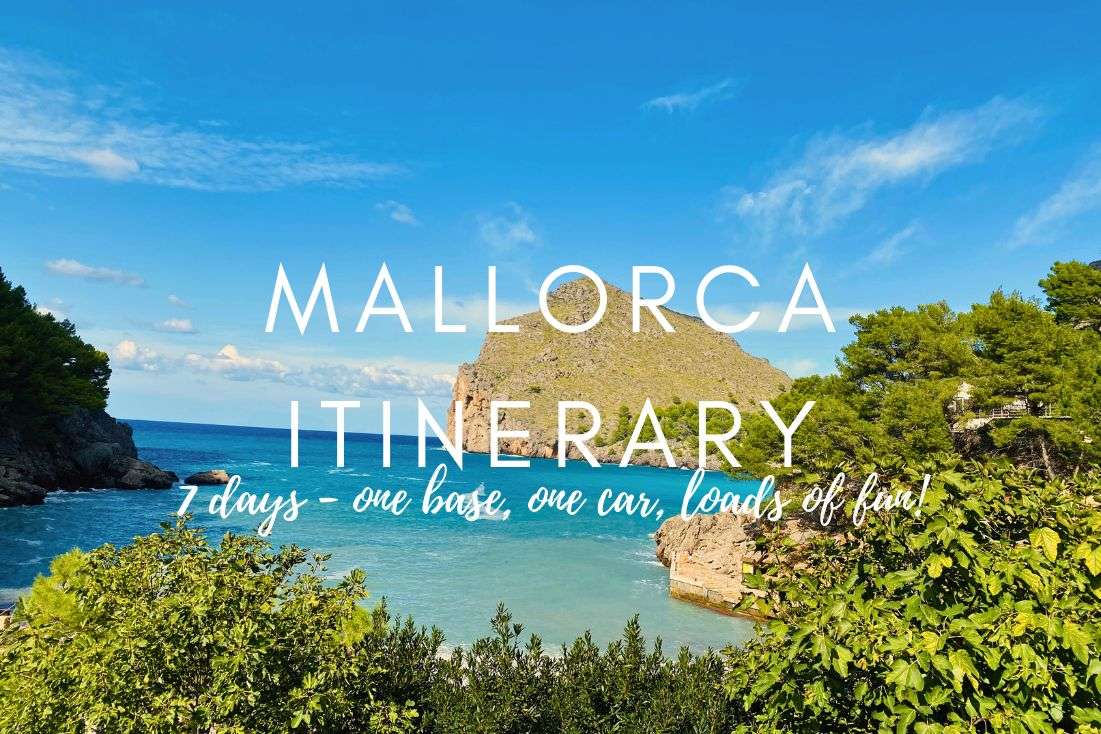
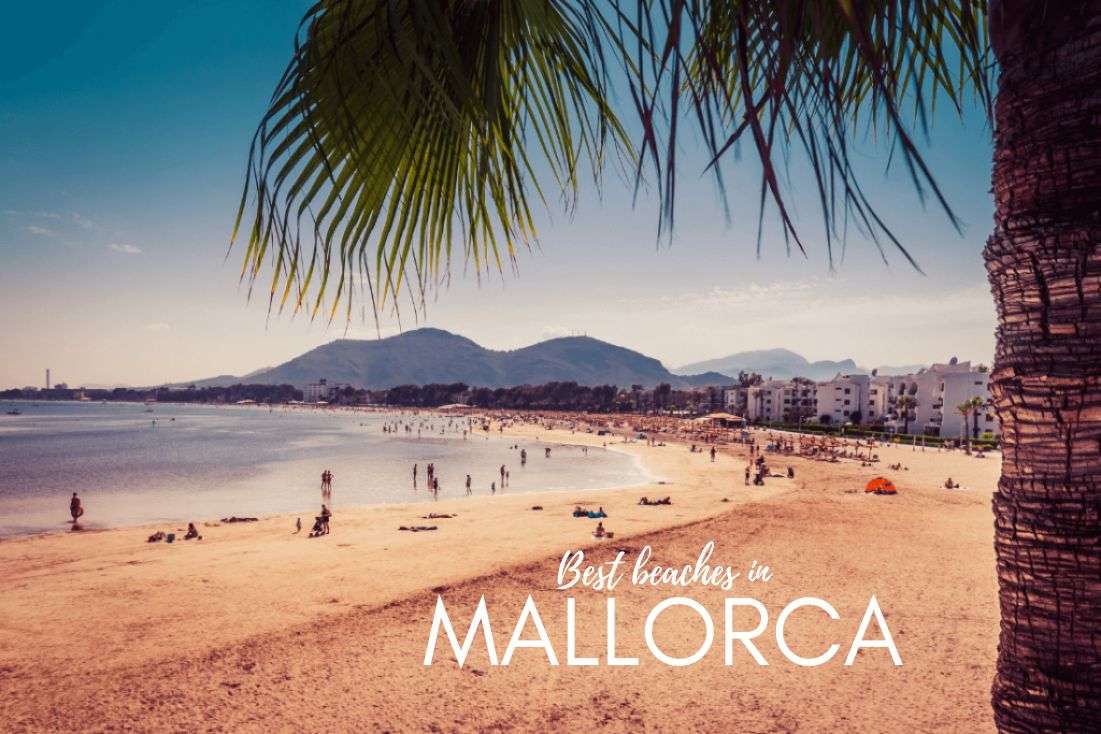
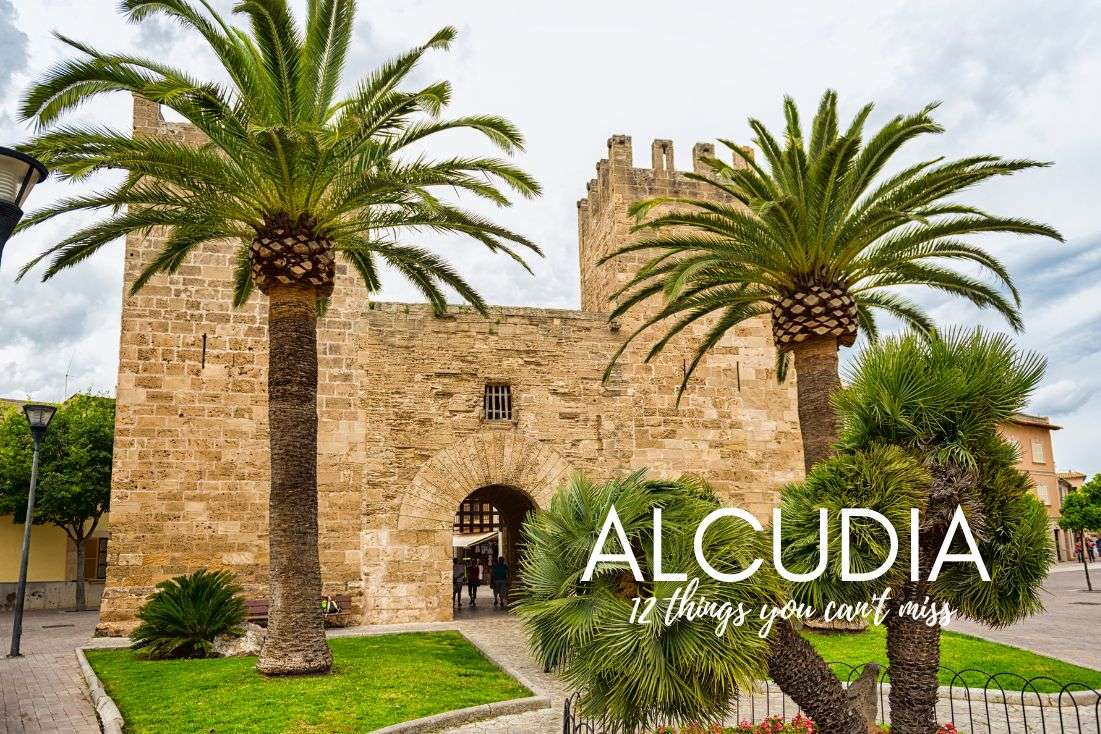



Comments | Thoughts? Give us a shout!